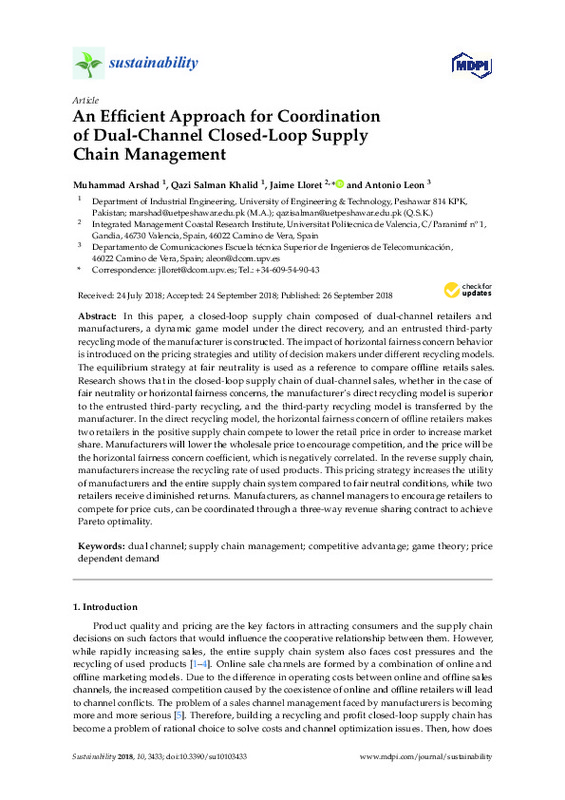JavaScript is disabled for your browser. Some features of this site may not work without it.
Buscar en RiuNet
Listar
Mi cuenta
Estadísticas
Ayuda RiuNet
Admin. UPV
An Efficient Approach for Coordination of Dual-Channel Closed-Loop Supply Chain Management
Mostrar el registro sencillo del ítem
Ficheros en el ítem
| dc.contributor.author | Arshad, Muhammad
|
es_ES |
| dc.contributor.author | Khalid, Qazi Salam
|
es_ES |
| dc.contributor.author | Lloret, Jaime
|
es_ES |
| dc.contributor.author | León Fernández, Antonio
|
es_ES |
| dc.date.accessioned | 2020-05-13T03:02:43Z | |
| dc.date.available | 2020-05-13T03:02:43Z | |
| dc.date.issued | 2018-10 | es_ES |
| dc.identifier.uri | http://hdl.handle.net/10251/143000 | |
| dc.description.abstract | [EN] In this paper, a closed-loop supply chain composed of dual-channel retailers and manufacturers, a dynamic game model under the direct recovery, and an entrusted third-party recycling mode of the manufacturer is constructed. The impact of horizontal fairness concern behavior is introduced on the pricing strategies and utility of decision makers under different recycling models. The equilibrium strategy at fair neutrality is used as a reference to compare offline retails sales. Research shows that in the closed-loop supply chain of dual-channel sales, whether in the case of fair neutrality or horizontal fairness concerns, the manufacturer's direct recycling model is superior to the entrusted third-party recycling, and the third-party recycling model is transferred by the manufacturer. In the direct recycling model, the horizontal fairness concern of offline retailers makes two retailers in the positive supply chain compete to lower the retail price in order to increase market share. Manufacturers will lower the wholesale price to encourage competition, and the price will be the horizontal fairness concern coefficient, which is negatively correlated. In the reverse supply chain, manufacturers increase the recycling rate of used products. This pricing strategy increases the utility of manufacturers and the entire supply chain system compared to fair neutral conditions, while two retailers receive diminished returns. Manufacturers, as channel managers to encourage retailers to compete for price cuts, can be coordinated through a three-way revenue sharing contract to achieve Pareto optimality. | es_ES |
| dc.description.sponsorship | This research was funded by Ministerio de Economia, Industria y Competitividad, Gobierno de Espana grant number BIA2017-87573-C2-2-P. | es_ES |
| dc.language | Inglés | es_ES |
| dc.publisher | MDPI AG | es_ES |
| dc.relation.ispartof | Sustainability | es_ES |
| dc.rights | Reconocimiento (by) | es_ES |
| dc.subject | Dal channel | es_ES |
| dc.subject | Supply chain management | es_ES |
| dc.subject | Competitive advantage | es_ES |
| dc.subject | Game theory | es_ES |
| dc.subject | Price dependent demand | es_ES |
| dc.subject.classification | INGENIERIA TELEMATICA | es_ES |
| dc.title | An Efficient Approach for Coordination of Dual-Channel Closed-Loop Supply Chain Management | es_ES |
| dc.type | Artículo | es_ES |
| dc.identifier.doi | 10.3390/su10103433 | es_ES |
| dc.relation.projectID | info:eu-repo/grantAgreement/AEI/Plan Estatal de Investigación Científica y Técnica y de Innovación 2013-2016/BIA2017-87573-C2-2-P/ES/DESARROLLO Y APLICACION DE ENSAYOS NO DESTRUCTIVOS BASADOS EN ONDAS MECANICAS PARA LA EVALUACION Y MONITORIZACION DE REOLOGIA Y AUTOSANACION EN MATERIALES CEMENTANTES/ | es_ES |
| dc.rights.accessRights | Abierto | es_ES |
| dc.contributor.affiliation | Universitat Politècnica de València. Departamento de Comunicaciones - Departament de Comunicacions | es_ES |
| dc.description.bibliographicCitation | Arshad, M.; Khalid, QS.; Lloret, J.; León Fernández, A. (2018). An Efficient Approach for Coordination of Dual-Channel Closed-Loop Supply Chain Management. Sustainability. 10(10). https://doi.org/10.3390/su10103433 | es_ES |
| dc.description.accrualMethod | S | es_ES |
| dc.relation.publisherversion | https://doi.org/10.3390/su10103433 | es_ES |
| dc.type.version | info:eu-repo/semantics/publishedVersion | es_ES |
| dc.description.volume | 10 | es_ES |
| dc.description.issue | 10 | es_ES |
| dc.identifier.eissn | 2071-1050 | es_ES |
| dc.relation.pasarela | S\377137 | es_ES |
| dc.contributor.funder | Agencia Estatal de Investigación | es_ES |








